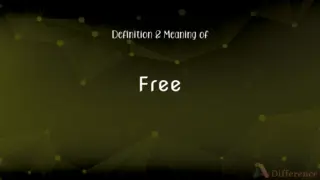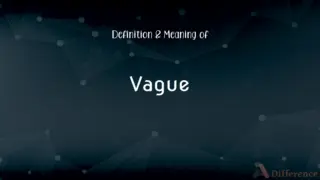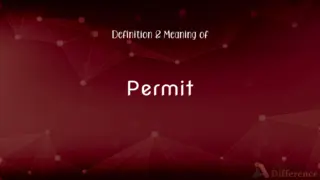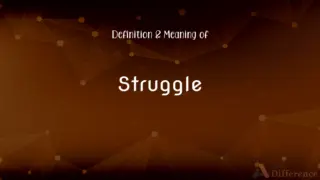Persecution vs. Prosecution — What's the Difference?
By Tayyaba Rehman — Updated on October 28, 2023
Persecution involves oppressive treatment, often for beliefs; prosecution refers to legal action against someone for alleged crimes.

Difference Between Persecution and Prosecution
Table of Contents
ADVERTISEMENT
Key Differences
Persecution is the act of subjecting someone to hostility or ill-treatment, often for their beliefs or identity, whereas prosecution is the legal process of charging someone with a crime and bringing them to trial.
Victims of persecution are targeted for who they are or what they believe in, while those facing prosecution are accused of violating laws.
Persecution often stems from societal or institutional discrimination, but prosecution is carried out by legal authorities following laws.
The aim of persecution is to oppress or harm, while prosecution seeks to establish legal guilt and administer justice.
Persecution can be based on religion, ethnicity, or political views, but prosecution is based on evidence of criminal activity.
ADVERTISEMENT
Comparison Chart
Definition
Oppressive treatment for beliefs or identity
Legal action against alleged crimes
Target
Individuals for their beliefs/identity
Individuals for legal violations
Basis
Discrimination, hostility
Legal codes, evidence
Aim
Oppression, harm
Legal justice, accountability
Context
Societal, institutional
Judicial, legal system
Compare with Definitions
Persecution
Ill-treatment for personal identity.
Ethnic persecution displaced many from their homes.
Prosecution
Holding someone legally responsible.
The company faced prosecution for environmental violations.
Persecution
Harsh treatment due to beliefs.
They faced persecution for their religious practices.
Prosecution
Enforcing law through legal action.
Prosecution plays a vital role in the justice system.
Persecution
Unjust treatment based on differences.
She spoke out against the persecution of journalists.
Prosecution
The act of prosecuting.
Persecution
Suffering due to one's beliefs.
His writings reflect his persecution for political views.
Prosecution
The institution and conduct of a legal proceeding
Risked prosecution by breaking the law.
Persecution
Organized mistreatment of a group.
Historical documents reveal the persecution of minorities.
Prosecution
See prosecuting attorney.
Persecution
Persecution is the systematic mistreatment of an individual or group by another individual or group. The most common forms are religious persecution, racism and political persecution, though there is naturally some overlap between these terms.
Prosecution
The act of prosecuting a scheme or endeavor.
The prosecution of the war fell to Winston Churchill.
Persecution
The act or practice of persecuting on the basis of race, religion, gender, sexual orientation, or beliefs that differ from those of the persecutor.
Prosecution
(legal) The institution of legal proceedings (particularly criminal) against a person.
Persecution
The condition of being persecuted.
Prosecution
(legal) The prosecuting party.
Persecution
The act of persecuting.
Prosecution
(legal) In many countries, a legal body and institution, usually part of the state apparatus, empowered to perform prosecution. Prosecutor's Office. See Prosecutor.
Persecution
A program or campaign to subjugate or eliminate a specific group of people, often based on race, religion, sexuality, or social beliefs.
Prosecution
The act or process of prosecuting, or of endeavoring to gain or accomplish something; pursuit by efforts of body or mind; as, the prosecution of a scheme, plan, design, or undertaking; the prosecution of war.
Keeping a sharp eye on her domestics . . . in prosecution of their various duties.
Persecution
The act or practice of persecuting; especially, the infliction of loss, pain, or death for adherence to a particular creed or mode of worship.
Persecution produces no sincere conviction.
Prosecution
The institution and carrying on of a suit in a court of law or equity, to obtain some right, or to redress and punish some wrong; the carrying on of a judicial proceeding in behalf of a complaining party, as distinguished from defense.
Persecution
The state or condition of being persecuted.
Prosecution
The institution and conduct of legal proceedings against a defendant for criminal behavior
Persecution
A carrying on; prosecution.
Prosecution
The lawyers acting for the state to put the case against the defendant
Persecution
The act of persecuting (especially on the basis of race or religion)
Prosecution
The continuance of something begun with a view to its completion
Prosecution
Bringing legal charges against someone.
The prosecution of the corrupt official began today.
Prosecution
Court action for alleged crimes.
The prosecution presented strong evidence.
Prosecution
Attempting to prove guilt in court.
The prosecution's case was based on forensic data.
Common Curiosities
Are persecution cases always religious?
No, they can be based on various grounds.
Does persecution require legal proof?
Not always, it can be societal or institutional.
Is prosecution only for serious crimes?
No, it can be for any alleged legal violation.
Can persecution lead to prosecution?
Yes, if persecutors commit legal offenses.
Can prosecution be unjust?
Unfortunately, it can, due to legal flaws or bias.
Can persecution be a state policy?
Tragically, it can in some regimes.
Who conducts a prosecution?
Typically, state or federal prosecutors.
Is prosecution always fair?
It aims to be, but can be influenced by various factors.
Can someone be wrongly prosecuted?
Yes, wrongful prosecutions can occur.
Can persecution have long-term effects?
Absolutely, it can have deep psychological impacts.
What is a prosecutor’s role?
To present evidence against the accused in court.
Is persecution always violent?
Not necessarily; it can be psychological or social.
Can someone face persecution without proof?
Yes, persecution often doesn’t require evidence.
Can one defend against prosecution?
Yes, the accused has the right to a defense.
Are there laws against persecution?
Yes, many countries have anti-discrimination laws.
Share Your Discovery

Previous Comparison
Security vs. Privacy
Next Comparison
Abaya vs. JilbabAuthor Spotlight
Written by
Tayyaba RehmanTayyaba Rehman is a distinguished writer, currently serving as a primary contributor to askdifference.com. As a researcher in semantics and etymology, Tayyaba's passion for the complexity of languages and their distinctions has found a perfect home on the platform. Tayyaba delves into the intricacies of language, distinguishing between commonly confused words and phrases, thereby providing clarity for readers worldwide.












































